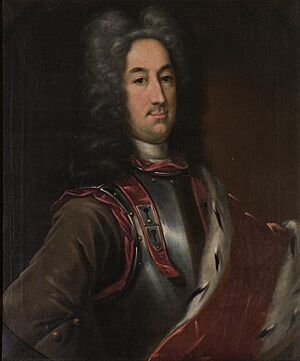Alexander Hume-Campbell, 2nd Earl of Marchmont facts for kids
Alexander Hume-Campbell, 2nd Earl of Marchmont (1675–1740) was an important Scottish nobleman, politician, and judge. He lived during a time of big changes in Great Britain. He played a key role in Scottish law and government.
Contents
About His Life
Alexander was born in 1675. He was the third son of Patrick Hume, 1st Earl of Marchmont. His mother was Grisel Ker. In 1697, Alexander married Margaret Campbell. She was the daughter of Sir George Campbell of Cessnock. When they married, Alexander added "Campbell" to his last name. This is how he became Alexander Hume-Campbell.
Education and Law Career
Alexander studied law at Utrecht University in the Netherlands. He became a lawyer, known as an advocate, in 1696. In 1704, he became a judge in the Court of Session. This was Scotland's highest court. He was given the special judge title of Lord Cessnock. He worked as a judge until 1714.
Political Roles
Alexander was a Commissioner for Berwickshire in the Parliament of Scotland in 1706. He strongly supported the Union between Scotland and England. This Union created Great Britain. From 1716 to 1733, he held a very important job. He was the Lord Clerk Register. This role meant he was in charge of keeping public records in Scotland.
Diplomatic Work
Alexander also worked as an ambassador for Great Britain. An ambassador represents their country in another nation. He was the ambassador to Denmark from 1715 to 1721. Later, in 1722, he was an ambassador at a big meeting called the Congress at Cambray.
Earl of Marchmont
In 1724, Alexander's father passed away. Alexander then became the 2nd Earl of Marchmont. This meant he inherited his father's title and lands. From 1727 to 1734, he was a Scottish representative peer. This meant he was chosen to represent Scotland's noble families in the British Parliament.
Helping Children
Alexander was also one of the first leaders of the Foundling Hospital. This was Britain's very first charity to help children. It received its official permission, called a royal charter, in 1739. The Foundling Hospital helped care for abandoned children.
 | Kyle Baker |
 | Joseph Yoakum |
 | Laura Wheeler Waring |
 | Henry Ossawa Tanner |


